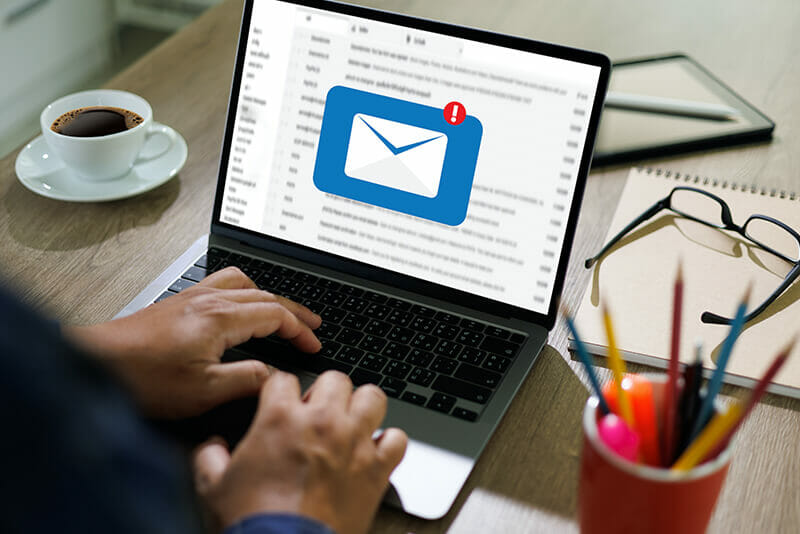When we talk about the must-haves of business nowadays, automating sales processes is going to rank pretty high on any list. There are countless tools and CRM systems right at your fingertips, and they can do everything from simplifying your sales journey to boosting productivity, allowing you to work smarter (not harder) than ever before.
But first, you have to understand how you can automate sales processes in a way that genuinely makes a difference.

When talking about automating your sales process, it is important to choose the right CRM. Some CRMs like Salesforce, HubSpot, and Zoho offer various features to automate different aspects of sales. So, when selecting your CRM, you need to weigh factors like ease of integration with existing sales tools, customization capabilities, and the analytics provided.
Other tools that you can include are systems such as Mailchimp for email marketing, LinkedIn Sales Navigator for prospecting, and Zapier if you want to integrate multiple applications. It might take you a bit, but the right blend of tools will help your sales team reduce their manual efforts and focus on more strategic and necessary tasks.

Now, let’s talk about automating lead management as part of automating sales processes. The first stage of any good sales funnel is capturing and nurturing leads, but that takes up quite a bit of time and effort. Automation tools can streamline lead generation through forms on your website, social media platforms, and targeted ads on various platforms. Plus, implementing automating lead scoring systems can help prioritize prospects, making sure your sales team knows which leads are more promising and should be engaged with first.
Moreover, automating follow-ups via personalized email campaigns is a great way to keep up engagement with those same potential customers. Tools like Mailchimp and ActiveCampaign allow businesses to design tailored strategies for specific audience segments, meaning businesses can nurture leads directly through relevant content that gradually guides them down the sales funnel.

Timely and consistent communication is key to closing sales. Automated responses can acknowledge inquiries or pre-qualify leads, ensuring that prospects feel attended to, even when your team is unavailable. Scheduled emails, chatbots, and social media automation can sustain dialogue with prospects and customers alike.
For instance, utilizing chatbots on your website can provide immediate assistance and gather customer information, freeing up your sales team for more complex interactions. Similarly, a well-structured email sequence can move leads through the funnel, sharing valuable content at critical touchpoints.

As a business owner you already likely know just how much of your sales team’s time is taken up with administrative tasks. Automating data entry and reporting not only saves them time, letting them focus on other aspects of business and bringing in more sales, but it also makes data more accurate.
One example of this is syncing CRM systems with other business applications, which in turn automatically logs interactions and updates client profiles so your team always has the latest info. Additionally, automated reports and dashboards can provide real-time insights into your sales pipeline’s performance. These analytics empower your sales team to make more data-driven decisions, adjust strategies even on the fly, and forecast future sales trends much more accurately.
The final step in automating sales processes is to continually analyze, optimize, and improve. Metrics such as conversion rates and deal velocity should be regularly reviewed to ensure that the approach aligns with business goals and market dynamics.
To make sure that you are optimizing and improving properly, make sure you are getting feedback from your team so you can identify and rectify bottlenecks or inefficiencies. Also, remember to remain open to incorporating new tools or strategies to further enhance performance.

In the end, by tapping into the power of sales automation tools and CRM features, businesses can not only improve efficiency but also unlock greater growth potential through automating sales processes. This approach can transform how your sales team operates, granting them more time to do what they do best: foster meaningful relationships and drive sales. So, what are you waiting for? Get started today and watch your sales process transform into a well-oiled machine that works for your business, not against it. Want to find out how we can help you? Let’s chat.
If you have missed the email campaign train (excuse the rhyme), then you have missed a major marketing opportunity. Businesses of all types are building their email lists and utilizing this method to communicate updates, sales and so much more!
Are recipients guaranteed to open every email? Nope, but they are on that list for a reason- whether they already made a purchase or expressed some sort of interest in your company!
So, what is your business missing out on by not catering to a well-established group of subscribers? Good news: it’s not too late to jump back on that email campaign train! And with some additional clarification on different types of content and campaigns, you’ll be an expert in no time!

Did you know over 4 billion people use email on a daily basis? And by 2023, that number is only expected to grow. A majority of email users check their inboxes more than once a day and it’s how they find/receive the most coupons and promotions.

Businesses of all sizes and niches utilize email campaigns, so don’t worry about your business not being a “great fit” or not being “big enough”. It’s all about testing out what works the best for your specific situation and catering your content for optimized results.
Speaking of content, that leads us to our next pertinent topic: types of email campaigns and the content they include!
In case you’re wondering if you accidentally clicked the wrong link, this isn’t an article about trees. However, it just so happens that the term is named after evergreen trees, considering they don’t lose their leaves and remain consistent no matter the season!
When we refer to evergreen content, we are talking about content that remains relevant and relatable for a long period of time. Ideally, you can use evergreen content for years without it becoming outdated or irrelevant.
Evergreen content is great because of its ‘one and done’ vibe, which ends up saving you a lot of time and effort. Create some evergreen content once and use it over and over again. It’s great for editing a bit and repurposing down the line (with minimal work required).
If you take this concept and apply it to email, you have (drumroll, please): an evergreen email campaign! It’s consistent and does a great job with helping you build a relationship with subscribers.
Let’s look at some things that would fall into this category:
What to avoid:
× Anything seasonal
× News articles
× Anything considered trendy
Broadcast campaigns are quite the opposite of evergreen campaigns, and (in our opinion) much easier to understand and create.
Broadcast campaigns are your standard time-sensitive emails where in a month or even a few days they can have a totally different meaning. This is probably the bulk of what appears in your inbox, especially from stores and restaurants.
Although broadcast campaigns aren’t going to be part of the “one and done” mindset like evergreen campaigns, they are good ways to get attention quickly.
Some examples from this category would be:
With broadcast campaigns, you don’t really need to worry about what to avoid. Honestly, the options are endless with this one! They are a great way to attract attention and create a quick uptick in revenue.

So, all this information is great, right? But what about how to proceed? Which type of campaign is working better? How will you know what to change or what to add? How will you know if this email stuff is worth it??
That’s where Zoho Campaigns comes in! You don’t have to be alone in this email maze, paying for multiple services recommended by multiple blog posts. Zoho Campaigns is a one-stop shop for your email marketing needs!
Not only will it automate processes for you and cultivate a growing subscriber list, but Zoho Campaigns allows you to conduct A/B testing and determine what’s actually working the best!
Test out types of content (ahem, like evergreen vs broadcast) while tailoring your intended audience.
Zoho Campaigns will track who is opening your emails and all kinds of other helpful subscriber stats that will move your email marketing right along. You no longer have to fear that you’re wasting time on something that isn’t working– Zoho has your back!

Email marketing can be super effective and doesn’t have to be a headache. Hopefully we have convinced you it’s not that hard to get started on your email campaign journey, and that there’s always resources ready to guide you out of a conundrum!
As always, we’d love to hear about what works for you and what you can do without– after all, we care about your success! Until next time, Email Explorers…
Want to find out how we can help you? Let’s chat.
Sure, it’s easier to focus on customers we have already acquired. We have them hooked; now, how do we keep them loyal and continuously coming back for more?
However, customer retention is just one piece of the puzzle, and it’s beneficial to keep an eye on the whole process. Where did these customers come from? What piqued their interest in the first place?

If companies don’t have any interest in leads and where they come from, they’re missing out on a whole wealth of information and opportunities. Not to mention, a company without a lead focus is severely squandering marketing potential!
So what are some more specific reasons you should be placing a more significant emphasis on leads? Well, it’s your lucky day– We have conveniently compiled some goodies for you!
Companies have to define who is interested in their product or service and then tailor their approach to cater to these people effectively. These people are considered leads and are then classified as potential customers.
Leads are a way to hone in on what will most likely bring you business while allowing you to use resources more strategically. Sure, conversion is arguably the most crucial part of any business, but we can’t forget the beginning stages of lead generation!
If you’re looking for some more information, we happen to have a handy-dandy blog post all about leads right here!

Once a lead converts into a sale, it integrates with the sales team and their process. A conversion will then hopefully become a consistent customer, and that is, of course, the main goal for a company!
However, what came before the conversion? The many efforts from the marketing team! Every company invests in a certain level of marketing, and how do you know if it’s money and time well spent if there’s no analysis of this process?
Applications like Zoho’s Page Sense can measure website metrics, better understand site visitors, and create a more personalized experience for these visitors. It takes a look at CTA clicks, heatmaps, and overall engagement on the website. From these metrics, companies can get a better handle on leads and understand where conversions are originating.
Page Sense also integrates with other applications that analyze site performance, like Google Analytics. This way, companies have an even more thorough perspective on website metrics!
The bottom line? An application like Page Sense can help your company analyze its lead process and areas that need more focus. With this comes a better understanding of marketing ROI– and it may even highlight areas where marketing budgets can save some cash!
Again, there’s a lot of lead-up to a sales conversion. (See what we did there?) Marketing approaches like email, social media, and landing pages are all elements that prompt a potential customer to engage and seek more information.

A leading player in the lead generation process is, of course, your landing page. An excellent landing page provides direction for a potential customer and hopefully entices them to sign-up for something/volunteer information. Zoho’s LandingPage feature is a great way to optimize your landing page by taking a look at page and visitor statistics and allowing you to A/B test different content.
Zoho also has other marketing applications that can help optimize your email and social media campaigns. What better way to generate leads than consistently showing up in inboxes and on social feeds? Zoho can help you be just persistent enough to intrigue potential leads without making them want to chuck their phones at you.
A great way to save time and money in our marketing ventures? Automating what can be automated. Zoho’s Marketing Automation option does just that, giving you a 360 view of your marketing process. Take a step back and analyze aspects like the planning stage and marketing ROI, along with every detail in between.
Marketing Automation emphasizes complete lead management and the best way to approach it. It analyzes lead nurturing paths, allowing companies to tailor different lead process elements.
Upfront, it will take some time and energy to get it right. Once you gain some momentum, however, applications like this will be saving you a reasonable amount of time and money. Spending some extra time on leads and process automation now can mean more time to spend on everything else later!
Have we convinced you yet? Leads are not precisely something a successful company can skip!
The good news is that if you are overwhelmed by lead generation and where exactly to start, there are many resources out there to help make the process a little easier. Not to mention, Woggle is always here to help get you started with Zoho and the applications that will suit your specific needs!
Let’s take a journey back in time. Before wifi and social media. Before YouTube tutorials and the “there’s an app for that” mantra. How did businesses cope? How did they troubleshoot problems? Well, since they couldn’t always Google the solution, they had to rely on professional connections and resources. They had to seek help outside the company or hire staff that could handle these problems. Much like today, no single business could do it all themselves!

That’s where services like Zoho step in. Zoho is more than a CRM- they have an application for anything you could possibly need. They have created more than 45 apps for your business to utilize! Need help with recruiting new employees or scheduling current ones? They have an application for that. Need help building forms or managing social media? Zoho has an application for that!
Imagine you are a business owner. You look down at your phone one day and among Candy Crush Saga and your weather application, you suddenly notice 45 additional Zoho apps. Where would you begin? Would you be overwhelmed? Personally, we would probably panic-delete everything.
Zoho is a perfect all-in-one solution for any business, but where’s the best place to start? This exact question is why Zoho consultants exist: to assist businesses with effectively using the services they purchase. Consultants take the overwhelm out of the process, while allowing business owners the chance to focus on whatever else they need to.
Although taking away some stress and overwhelm is a great reason on it’s own, we’ve compiled 5 more reasons to consider a Zoho consultant!

Consider your company and the amount of people who have been hired. How many of them walk in and get straight to work? Skip the training, they’ve got it! Probably doesn’t happen much (if at all) does it?
Zoho consultants are no different. They aren’t your run of the mill helpline- they have been specially trained to handle your situation and identify what your business needs from Zoho. Consultants have the expertise to tell you what software you need and what you can skip. They have the capability to guide your business in the right direction, while saving you from getting bogged down with small details.

Zoho consultants have worked with many businesses. On top of being trained, they have the experience to back-up their suggestions. It is entirely possible that they have worked with a business similar to your’s in the past- whether it was the same size, same industry or encountered the same types of challenges.
They can guide you away from making mistakes other companies have made and give you valuable insight into what they’ve seen work! You’re paying for Zoho, why not invest in someone who truly understands how to use it?
As you may know, Zoho is not just a one-time, one-package deal. You don’t get stuck with software you’ll never use or services that don’t make sense for your business. You can truly customize what you get and tailor your experience to your business needs. Consultants cater to this- they get to know your business and evaluate what pieces of Zoho would work best for you.
On your own, you may have a general idea about what you need, but you might forget about a few details or not realize all the types of applications available. A consultant can help you make the best customization decisions!
Alas, the question that always shows its ugly head: Who has time for this? And honestly, no one in your company (especially you) has the time to sit down and thoroughly research anything, let alone research 45+ Zoho applications. Plus, there’s rarely (especially in the current workforce climate) a person within your company to delegate this task to! So, who does have time for this? A Zoho consultant, of course!

Consultants can get to know your business and then put together a plan without you having to stress over it. This gives the opportunity to focus on whatever else you need to focus on. After all, when running a small business, there’s no shortage of problems to fix and issues to consider, right? Fitting Zoho into your business should be a helpful advantage, not another item on your to-do list.
At what stage do you need a Zoho consultant? There’s no right or wrong answer here! It would be helpful to have their expertise from the beginning, but they will join you mid-process as well. Consultants don’t dictate when they can help- you have the ultimate say!
They also stick with you through your business journey. There’s no time constraints, which means one less thing to worry about. If you have questions months after they get you set-up with Zoho, your consultant will still be willing to find answers for you!
Choosing where to spend your time and money is a daunting task. There’s no completely straightforward or risk-free business plan in existence But the one thing that’s alway beneficial? Some solid, old-fashioned expertise. Consider hiring a consultant so you can get the most out of the wonderful things Zoho has to offer! After all, one less thing on your plate is never a bad thing!

What is a "Qualified Lead"?
Take a moment and think: Have you ever sat down to unwind in the evening, grabbed a cold drink, and pulled out your phone to browse Instagram, Pinterest, or your favorite blogs? Have you ever signed up for a free ebook? Perhaps a free guide? Maybe a coupon? If any of that sounds familiar, you have more than likely been considered a Qualified Lead!
A Qualified Lead (QL) is someone a company has identified as a potential customer. Figuring out who is most likely to buy a specific product or service is key. If companies do not attempt to focus on who actually has the best chance of going from a lead to a sale, they are wasting valuable time and resources somewhere along the way.
A specific definition of a Qualified Lead is extremely important for a sales team, and they should revisit and reconsider it often. According to Hubspot, only 34% of companies with no formal definition were able to advance a lead to a first discussion more than half of the time. When the companies had clear definitions, that percentage increased to 63%!
Every company will define their Qualified Lead differently because each company caters to a unique type of customer. Therefore, individual marketing teams have to consider what criteria will truly give the insight they need. To define the target customer, they may consider:

The marketing team encounters the potential customer first. With a solid digital marketing strategy, companies will attract attention from a variety of audiences. Qualified Leads will distinguish themselves through engagement with anything the marketing team puts out there. This may include podcast subscriptions, watching YouTube videos, or engagement with social media posts and ads . Qualified Leads may sign up for email updates/newsletters as well.
Many marketing strategies are depending more and more on providing free content. What better way to show expertise on a topic? For instance, say you are searching for more tips and tricks on marketing and increasing website traffic. You find a company with a free webinar giving you tons of useful information on the topic. You realize the company offers a fairly priced package with an analysis of your marketing approach and advice to improve your overall strategy. Now that you’ve seen that they know what they’re doing, why not go for the complimentary consultation? You have just become a Qualified Lead for the company, all because they earned your interest and trust through free content.
Customers need to show a certain level of interest in what the company has to offer. If this is not the case, is it truly worth the company’s time? Cold calling and prospecting is still a thing in the marketing realm, but it’s much more time and resource efficient to utilize leads. A Qualified Lead is based on actual market research and shows that the potential customer has already taken a few steps in the right direction. Research shows that people have often already made 50% of the buying decision before even talking to the sales team.
There are different types of Qualified Leads. When the marketing team has identified someone as a Qualified lead, they are decently confident this could convert to a sale. This is a Marketing Qualified Lead (MQL).
Once they hold up their end of the bargain, the marketing team hands the MQL over to the sales team. The sales team further evaluates the likelihood of the MQL becoming a paying customer. Sometimes the customer will express specific interest in taking the next step, giving the sales team even more reasons to proceed. Often the BANT system is utilized at this point:
If the sales team decides to proceed with the MQL, the MQL transitions to a Sales Qualified Lead (SQL).
This whole process seems straightforward, but nothing will work smoothly unless the company sales and marketing teams are on the same page. It benefits everyone to agree on the criteria for a Quality Lead. Not only does a company need to establish a definition in general, but marketing and sales need to decide on the definition together. Agreeing on QL criteria will optimize conversion rates and digital marketing strategies. How will any company know what’s working best if sales and marketing function as two completely separate entities?
Quality Leads are important and companies are out there using these QL’s to their advantage! Instead of cold-calling or pursuing just any “potential customer”, consider what your business can offer to entice the customer to come to you. How can you adjust your online/social media presence to attract people seeking certain information? What is in your toolbox that could bring your company Quality Leads? Optimize the time of your sales and marketing teams while still finding the customer that is the right fit!
-Off you go! Your horizon awaits.
What is ECommerce?
As businesses rapidly gravitate to the online space, you’ve likely heard the word “Ecommerce” thrown around, even in casual conversation.
In fact, if you’ve just Googled “What is ECommerce?” under the table on a first date so you can keep the conversation going, we’ve got your back.

Our friends at Shopify put it simply. “Ecommerce, also known as electronic commerce or internet commerce, refers to the buying and selling of goods or services using the internet, and the transfer of money and data to execute these transactions. Ecommerce is often used to refer to the sale of physical products online, but it can also describe any kind of commercial transaction that is facilitated through the internet.”
So, ECommerce is basically an online shop.
There are pretty important nuggets of wisdom you will want to know before you jump headfirst into an ECommerce business. For starters, you’ll want to know how to succeed.
There are a lot of moving parts to ensure any business’ success, but an ECommerce business has its unique needs.
The success of an ECommerce business is heavily reliant on a fully optimized website. After all, the website is the storefront, customer support, and cashier of an ECommerce setup. There are key elements that an ECommerce website must have that go beyond impressive product photos.
To succeed as an ECommerce business, your website needs to be:

Shopify is really the one-stop-shop (see what we did there?) for ECommerce entrepreneurs. Not only does Shopify check off every item listed above, but they make marketing your business effortless right from the app! You can also utilize other sales channels like Walmart Marketplace, eBay, Facebook, and Instagram with Shopify. If you’re wanting to test the waters, let us know here and we’ll sign you up for a free 14-day trial.
There are so many ways to market an ECommerce business. So many, in fact, that you may feel overwhelmed on where you should start. Marketing trends are always ebbing and flowing as algorithms change. At Woggle, we’re all about empowering you with resources and automation so you can keep it simple. ECommerce businesses don’t market themselves, but Shopify can do the heavy lifting for you. Here’s how.
Email marketing is still effective! Yes, even in the world of social media. It turns out that people still want to hear from businesses in their inbox. The proof is in the stats.

Shopify knows the proof is in the pudding (do people still say that?). That’s why they offer email marketing capabilities right in the app. ECommerce businesses can utilize pre-made templates to cut down on time. An added bonus is that you don’t have to hire a designer. Once you have customized your template, Shopify allows you to:
This Shopify marketing feature is one of our favorites. Chatbots are an amazing tool for an ECommerce business to have. They elevate the customer experience by making product recommendations, lending a hand with FAQs, and offering discount codes in real-time.
Are you convinced yet that business chat is the way forward? Like email marketing, Shopify allows customization to your chat and shows you how it is performing in analytics. You can also integrate your chat into Facebook Messenger and other messaging apps. Shopify works seamlessly across various platforms so you don’t have to.
ECommerce businesses rely on ads to get their products front and center. Knowing where to start or even how to start an ad campaign can be a headache. The tricky thing about ads for most ECommerce businesses is figuring out where to advertise. Shopify takes the guesswork out of ads by setting you up for success in their platform.
Being able to advertise, sell, offer customer support, and market from one platform is invaluable to ECommerce business owners. Shopify offers impressive perks when it comes to advertising your products.

Our Woggle team has seen Shopify in action and it’s transforming Ecommerce businesses by increasing their ROI, improving the customer experience, and helping their ads be seen by their ideal customer.
Remember, we can sign you up for a free 14 day trial with Shopify if you’re not ready to commit and want to take it for a test drive.
Woggle is a huge fan of making business simple, and we’re equally as passionate about seeing your business grow! Reach out today, together we'll get everything sorted!
-Off you go! Your horizon awaits.

What is a flywheel? Well, we read the articles and called a few engineers to get to the bottom of this new term in sales and marketing and this is what we’ve come up with:
Flywheel
noun
Someone realized that this technical, and confusing, term would be great for marketing and sales teams. Which brings us to our definition, tailored for the evolving business world:
The point of shifting from a funnel to a flywheel is purely for the sake of the customers.
Customers have power, and they’re tired of being wooed and schmoozed through the sales funnel process. At the end of the funnel, they don’t fall into a hot tub of customer care. They usually fall off the company’s radar except for the occasional dry sales email.
The flywheel provides a different experience. Consequently, when you tie together service, marketing, and sales, you create a robust company with a dedicated and collective focus on the customers.
As the flywheel spins, customers fall into a vortex where they can always:
We’ve established the basis of the flywheel, but there are a few key takeaways to cover about the retiring funnel and the new heavy-weight champ.
1. The Sales Funnel Isn’t Dead (yet)
First, there is still a process needed to connect with and attract new leads. Every lead is at some point cold, or luke-warm and they need nurturing. Over time, we expect the marketing flywheel to take a larger role in this process because companies that use the flywheel will gain a reputation for outstanding customer care.
2. The Flywheel is About More Than Marketing
The idea of the flywheel is to pull in and protect customers. However, it doesn’t directly address the notion of leads because, essentially, you’re treating everyone as customers from the start. It’s 2021, and we’re finally figuring out that we should treat our customers better than our warm leads.
Let’s say someone comes across a company marketing campaign, and they show an interest. Then the sales team reaches out alongside support to learn more about the customer. Finally, marketing, sales, and support work side-by-side instead of pushing customers off of one person’s desk and onto another.
3. The Difference is a Matter of Approach
Customers that are loyal and naturally raise awareness for your brand are engaged, delighted, and constantly attracted to your company. However, most companies think of that situation and put it off because it sounds like a lot of work.
The flywheel allows companies to use their resources with more tact to accomplish these goals efficiently. You’re not asking your three primary teams to run at top speed all the time. Actually, it’s the opposite because using collaboration and proactive work means that customers receive more support and care with less internal effort.
The flywheel isn’t a self-perpetuating machine that will breed customer loyalty with little effort. Companies do have to put the work in and help to avoid flywheel friction.
There is the possibility of friction when:
This last issue is the most common when companies transition to flywheel thinking. Marketing, sales, and service all play a role in keeping the flywheel turning. So, if any section of the flywheel is heavier than the others it will introduce friction and reduce the momentum. This means it won’t turn properly, and will eventually come to stop.
Here is a quick breakdown that can help teams understand their part in the flywheel:

Leverage technology to reduce friction, align your teams, and ensure that your customers (including leads) get the best every time they interact with your company or product. Ultimately, companies can use complete business applications suites such as Zoho to manage customer relationships, marketing campaigns, support contacts, and more.
-Off you go! Your horizon awaits.